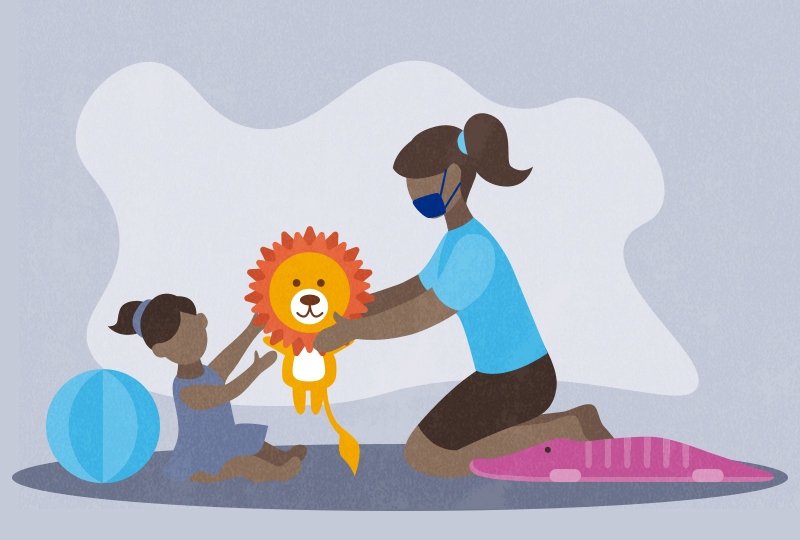Should you hire a babysitter during COVID-19? Six tips to consider

If you’ll be going back to work outside of the home, you may wonder if it’s safe to hire a babysitter during COVID-19. While this decision is a very personal one, for some families it can be an appealing alternative to using a daycare center— as long as you can find a caregiver you trust to follow social distancing guidelines outside of your home. This is important so they don’t put you and your child at unnecessary risk, says Jennifer Ormsby, director of infection prevention and control at Boston Children’s Hospital.
The old rules still apply — and more
Prior to COVID-19, most families extensively screened caregivers by checking their backgrounds and references. These things are still essential.
“You’ll also want to assess a babysitter’s maturity and knowledge of developmentally appropriate care, as well as CPR,” says Allison Scobie-Carroll, senior director of social work and family services at Boston Children’s. In addition, she says you’ll need to make sure the person’s personality and values will be a good fit for your child.
Beyond these basic steps, though, these days it’s also important to think more broadly about social distancing and hygiene. “You want to have a better understanding of the person’s risk of exposure in their daily life and make sure you are in agreement on what you consider safe to minimize risk to your family,” Ormsby says.
Best practices for bringing a babysitter into your home
Scobie-Carroll and Ormsby suggest that parents consider the following steps when hiring a babysitter:
- Come up with a shared list of practices you expect the babysitter to follow when they are not at your home. For instance, you want to make sure the person wears a mask when shopping or being around other people, keeps a distance of 6 feet or further from others, and washes hands often. You can look to the U.S. Centers for Disease Control and Prevention (CDC) guidelines to set the expectations and talk about them with the babysitter to make sure you are on the same page.
- Talk about the rules you want the caregiver to follow in your home. This should include thoroughly washing hands (they should sing the “Happy Birthday” song twice while washing) after using the bathroom, before preparing food and eating, and after blowing their nose. It should also include disinfecting high-touch surfaces at least a few times a day. Scobie-Carroll suggests parents provide the cleaning supplies (cleaners and paper towels, or Clorox wipes, soaps, and hand sanitizers) and have them easily accessible to the babysitter, while keeping these items safely out of reach of young children.
- Decide on a mask policy. Some families may want the babysitter to wear a mask the entire time they are in your home. In that case, it’s a good idea to provide one. Ormsby points out that other families may include the babysitter in their “trusted circle” and not require them to mask inside their home. This should be a shared decision that everyone is comfortable with.
- Make sure you can trust the babysitter to disclose any symptoms of illness. Also let them know you want them to cancel if they don’t feel 100 percent. While in the past many babysitters may have felt pressured to come to work even if they were sick, today it’s essential they not come in if they (or someone in their home) isn’t feeling well to help reduce your family’s risk of being exposed.
- If you prefer to send your child to a babysitter outside of your home, be sure to find out if there will be any other children there, if people will be coming to drop them off and pick them up, and if those other people will be masked if they come into the home.
- Remember that even the most diligent attempts at preventing COVID-19 can fail. If your babysitter tells you they tested positive for the coronavirus, you should reach out to your pediatrician and let them know immediately. Ask the clinician if your family members will need to be tested and if you should quarantine.
How to help your child adapt to a new babysitter
When interviewing babysitters, while you may conduct initial meetings over the phone or Zoom, once you find a caregiver you like, Scobie-Carroll suggests inviting the person into your home and watching them interact with your child. Since this adult will be left alone in your house with your youngster, you need to trust them and feel comfortable.
Your child needs to feel comfortable, too. Consider meeting a new babysitter outside for the first time so they can unmask and allow you and your child to see their face. This can help with bonding. Also remember that kids may be more anxious around a new person after being home with you for the past few months. Creating an environment that allows you, your child, and babysitter to be together a few times can build a comfort level before you go back to work, run errands, or have some time outside the home with your partner or friends.
Planning for fall
Keep in mind that taking the time to find the right babysitter this summer can be beneficial when fall comes around. Since no one yet knows what schools and daycare programs will look like in September, it may be time well invested to find a babysitter you trust to care for your child in the comfort of your own home.
Learn more about Boston Children’s response to COVID-19.
Related Posts :
-

Model enables study of age-specific responses to COVID mRNA vaccines in a dish
mRNA vaccines clearly saved lives during the COVID-19 pandemic, but several studies suggest that older people had a somewhat reduced ...
-

New insight into the effects of PPIs in children
Proton-pump inhibitors (PPIs) are frequently prescribed to suppress stomach acid in patients with gastroesophageal reflux disease (GERD). Prescribing rates of ...
-

Creating the next generation of mRNA vaccines
During the COVID-19 pandemic, mRNA vaccines came to the rescue, developed in record time and saving lives worldwide. Researchers in ...
-

Reversing the trend: Easing the mental health boarding crisis in emergency rooms
Anxiety, depression, and suicide attempts have been rising over the past decade, especially among teens, often landing them in emergency ...





